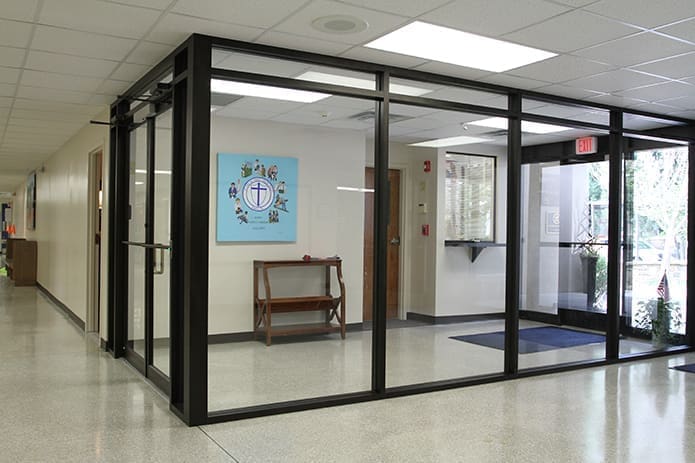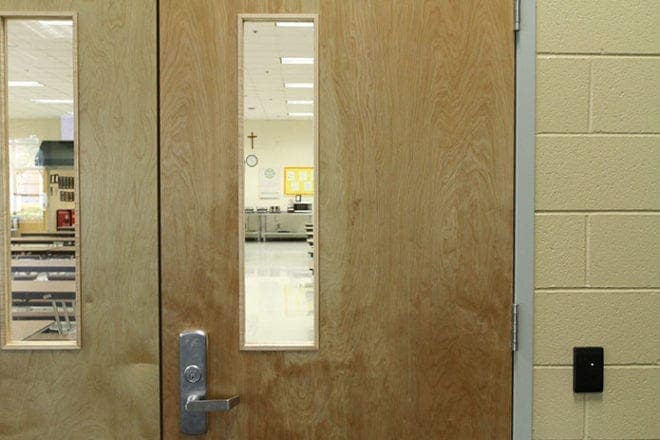 (Photo By Michael Alexander)
(Photo By Michael Alexander)Atlanta
Schools renovated for greater security
By ANDREW NELSON, Staff Writer | Published August 15, 2013
ATLANTA—Students at Catholic schools will be returning to classrooms with enhanced security on some campuses, with the addition of new alarms, greater control of access and closer relationships with local police departments.
“Like everybody, after the Newtown tragedy, (security) was on everybody’s radar,” said Frank Moore, the long-time principal at Blessed Trinity High School, Roswell.
“It’s in the back of our minds all the time,” he said.
The school spent some $25,000 to redesign its main entry area for greater security, in addition to other measures.
Administrators have to balance creating a secure school campus with making sure the new systems don’t disrupt learning.
“That is the big challenge. You don’t want children fearful because they are walking into an armed camp,” said St. Jude School Principal Patty Childs. “You need to ensure the children are safe.”
The December 2012 assault at Sandy Hook Elementary School in Newtown, Conn., where a gunman fatally shot 26 children and adults, spurred renovations at some Catholic schools. The goal of these projects is to limit access to classrooms and places where students congregate.
Dr. Diane Starkovich, Catholic schools’ superintendent, said all archdiocesan schools reviewed their security plans in the last school year after the Newtown tragedy. Schools have generally been proactive about their security measures out of concern for the well-being of students, she said in an email.
However, one can’t predict everything that can happen, as Newtown demonstrated. The gunman shot through a plate glass door to enter the school and the staff did everything they could in activating an intruder plan, Starkovich said.
While schools once drilled students on fire and severe weather, added to that now are lockdown drills.
Electronic locks on exterior doors at Blessed Trinity High School, with its 960 students, were the main security feature already in place. The locks were engaged once the school day began to prevent trespassers.
Moore invited security consultants and officers from the Roswell Police Department after the Connecticut shooting to go through the whole building to find weak spots. The audit found the layout of the main entry could put students at risk. A person previously could go through the main lobby and into the cafeteria without any barriers. No longer.

Once an open area with free access to visitors, today the only way to gain admittance to the school cafeteria at Blessed Trinity High School, Roswell, is by way of a key card. Photo By Michael Alexander
The main entrance has been redesigned. A new wall blocks off the cafeteria. And the new entry restricts visitors to the school store and the main office. Once in the main office, an administrator has to allow a person into the school’s hallways.
“If they get into the lobby, that’s fine. But what they cannot do is get to the classroom hallways. They don’t go anywhere without permission,” Moore said.
Other new features are emergency lock-down buttons in key administrative offices to trigger an alarm and engage the electronic locks if necessary. Also, all the classroom doors are permanently locked in case teachers need to shut them quickly.
The changes won’t affect a student’s day. Nothing has changed as far as they are concerned, Moore said.
“You want school to be open, welcoming, and an inviting place. You want to avoid the demeanor of being a prison. We haven’t lost that,” he said.
Patty Childs balances the security of her students with their need to learn.
Security should “not detract from the warm, comfortable, beautiful school,” but it is important to “tighten things up,” she said.
In the past at St. Jude those in the administrative offices did not have a clear sight of the front doors. Staff instead relied on a camera and an electronic lock to control the doors, but that is no longer enough, Childs said.
The school, which has been in existence for 50 years, instead constructed a new reception area at the front door. Here visitors and parents will wait until they are buzzed into the school before they can access the classrooms.
Also, Childs said the Sandy Springs school is reviewing its procedures for recess so kids can run and play, but also have more staff on duty.
After the shooting at Sandy Hook Elementary School, Childs and a counselor visited classrooms. She said it is important to keep parents and students informed about any security changes before they take place. Learning ahead of time can help the school’s 500 students from needlessly worrying about why door locks are changing or other new measures, she said.
She tells parents “we love their children as much as you do. We will do whatever it takes to keep them safe.”
Our Lady of Mercy High School, in Fayetteville, this summer had the most extensive renovation since its construction in the year 2000. A waiting area was built at the front entryway where a covered patio was enclosed. Two sets of doors with electronic locks will require visitors to be identified before entering the building. The project cost some $30,000.
Brian Newhall, the principal, said the construction is just one aspect of security in the school community. The school “fine tunes” the student body of over 400 to respond to emergencies, he said.
Local law enforcement officials for the first time are teaching faculty and administration how to respond if a gunman is on campus.
“It’s one of those things you don’t want to talk about, but it’s training you want to have,” Newhall said.